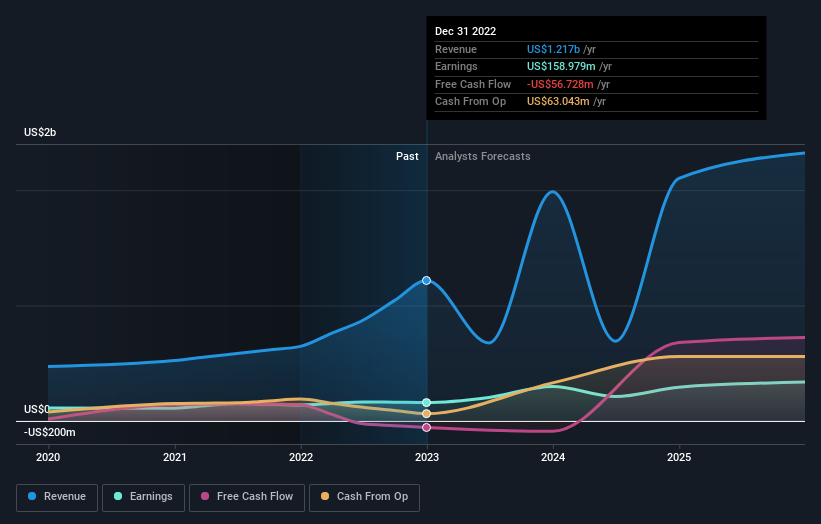Nickel Industries Limited's (ASX:NIC) top owners are private companies with 36% stake, while 30% is held by individual investors
Key Insights
The considerable ownership by private companies in Nickel Industries indicates that they collectively have a greater say in management and business strategy
A total of 6 investors have a majority stake in the company with 52% ownership
If you want to know who really controls Nickel Industries Limited (ASX:NIC), then you'll have to look at the makeup of its share registry. And the group that holds the biggest piece of the pie are private companies with 36% ownership. Put another way, the group faces the maximum upside potential (or downside risk).
Individual investors, on the other hand, account for 30% of the company's stockholders.
Let's take a closer look to see what the different types of shareholders can tell us about Nickel Industries.
View our latest analysis for Nickel Industries
What Does The Institutional Ownership Tell Us About Nickel Industries?
Institutional investors commonly compare their own returns to the returns of a commonly followed index. So they generally do consider buying larger companies that are included in the relevant benchmark index.
We can see that Nickel Industries does have institutional investors; and they hold a good portion of the company's stock. This implies the analysts working for those institutions have looked at the stock and they like it. But just like anyone else, they could be wrong. If multiple institutions change their view on a stock at the same time, you could see the share price drop fast. It's therefore worth looking at Nickel Industries' earnings history below. Of course, the future is what really matters.
Nickel Industries is not owned by hedge funds. Looking at our data, we can see that the largest shareholder is Tsingshan Holding Group Co., Ltd. with 19% of shares outstanding. In comparison, the second and third largest shareholders hold about 12% and 5.8% of the stock. Additionally, the company's CEO Justin Werner directly holds 1.0% of the total shares outstanding.
We also observed that the top 6 shareholders account for more than half of the share register, with a few smaller shareholders to balance the interests of the larger ones to a certain extent.
While studying institutional ownership for a company can add value to your research, it is also a good practice to research analyst recommendations to get a deeper understand of a stock's expected performance. There are plenty of analysts covering the stock, so it might be worth seeing what they are forecasting, too.
Insider Ownership Of Nickel Industries
The definition of company insiders can be subjective and does vary between jurisdictions. Our data reflects individual insiders, capturing board members at the very least. Management ultimately answers to the board. However, it is not uncommon for managers to be executive board members, especially if they are a founder or the CEO.
I generally consider insider ownership to be a good thing. However, on some occasions it makes it more difficult for other shareholders to hold the board accountable for decisions.
Shareholders would probably be interested to learn that insiders own shares in Nickel Industries Limited. This is a big company, so it is good to see this level of alignment. Insiders own AU$236m worth of shares (at current prices). Most would say this shows alignment of interests between shareholders and the board. Still, it might be worth checking if those insiders have been selling.
General Public Ownership
The general public-- including retail investors -- own 30% stake in the company, and hence can't easily be ignored. While this size of ownership may not be enough to sway a policy decision in their favour, they can still make a collective impact on company policies.
Private Company Ownership
Our data indicates that Private Companies hold 36%, of the company's shares. It's hard to draw any conclusions from this fact alone, so its worth looking into who owns those private companies. Sometimes insiders or other related parties have an interest in shares in a public company through a separate private company.
Next Steps:
I find it very interesting to look at who exactly owns a company. But to truly gain insight, we need to consider other information, too. Case in point: We've spotted 3 warning signs for Nickel Industries you should be aware of.
If you are like me, you may want to think about whether this company will grow or shrink. Luckily, you can check this free report showing analyst forecasts for its future.
NB: Figures in this article are calculated using data from the last twelve months, which refer to the 12-month period ending on the last date of the month the financial statement is dated. This may not be consistent with full year annual report figures.
Have feedback on this article? Concerned about the content? Get in touch with us directly. Alternatively, email editorial-team (at) simplywallst.com.
This article by Simply Wall St is general in nature. We provide commentary based on historical data and analyst forecasts only using an unbiased methodology and our articles are not intended to be financial advice. It does not constitute a recommendation to buy or sell any stock, and does not take account of your objectives, or your financial situation. We aim to bring you long-term focused analysis driven by fundamental data. Note that our analysis may not factor in the latest price-sensitive company announcements or qualitative material. Simply Wall St has no position in any stocks mentioned.
Join A Paid User Research Session
You’ll receive a US$30 Amazon Gift card for 1 hour of your time while helping us build better investing tools for the individual investors like yourself. Sign up here


